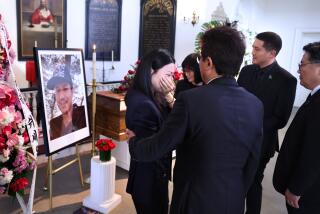Minister Says He Didn’t Tell Others of Suicide Threat
- Share via
A minister testified Monday that he did not tell the doctors or family of a depressed young man that the man had pledged to kill himself because the minister assumed they knew he was suicidal.
The Rev. Duane Rea said he also thought the suicide threat might simply be an attention-getting ploy.
Less than three weeks later, 24-year-old Kenneth Nally made good on that pledge, killing himself with a shotgun in a friend’s Burbank apartment.
Edward Barker, the Nally family’s attorney, has maintained that, if the family and doctors had known what the minister knew, they would have had Nally “tied up and carried away” to a psychiatric hospital against his will, preventing his April 1, 1979, suicide.
Rea, who said Nally was “like a son” to him, was the first defendant to testify in an unprecedented “clergy malpractice” trial. In the civil suit, the Nally family has accused Grace Community Church of the Valley in Sun Valley and four of its pastors of negligence in the counseling of their son.
Hospital Visit
The fundamentalist church has maintained that ministers repeatedly encouraged Nally to meet with physicians and a psychiatrist and that Nally’s parents ignored the doctors’ recommendations to commit their son to a psychiatric hospital.
Rea testified that he visited Nally at Verdugo Hills Hospital in Glendale in mid-March, 1979. Nally had been taken there semiconscious after overdosing on the drug Elavil, a strong anti-depressant, in what a psychiatrist who interviewed him determined was a suicide attempt.
Rea said Nally told him that, if given the opportunity after being released from the hospital, “he would try again.”
Rea said he “didn’t feel a necessity” to pass the information along to Nally’s physician, psychiatrist or family.
“He was already being treated,” Rea said. “I knew he was under care. I came there as a friend. I didn’t come as a doctor. I presumed they were all fully aware of why he was there. That would be pure redundancy.
“That’s like going to a fire, seeing firemen and calling the fire department.”
Rea amplified by saying that a promise to “try again” is not always an indication that an individual is in imminent danger of committing suicide. Many people threaten to commit suicide “just to get attention,” he said.
Asked whether Nally’s threat was a “red flag” that demanded action, Rea said, “It could be, but it might also be a ploy for attention.”
The family has asserted, however, that the information could have saved Nally’s life.
Barker contended in his opening statement last week that Nally’s March 12 drug overdose was the family’s first indication that their son was suicidal.
Threat Knowledge Alleged
He said that church pastors who counseled Nally for several years were aware that he had tried to kill himself three times before the March 12 attempt, that he regretted that he was not successful, and that he had pledged to try again.
Barker said he plans to present testimony to support those allegations today or Wednesday.
During his six-day stay at Verdugo Hills Hospital, Nally was seen by Dr. Christine Evelyn, a physician, and Dr. David Hall, a psychiatrist.
Hall testified last week that, after talking with Nally, he recommended to the parents that their son be hospitalized in a psychiatric facility. Nally refused to enter voluntarily, saying he had been advised by his church counselors “not to see a psychiatrist,” Hall testified.
Family Reluctant
Nally’s family hesitated to have him committed against his will, Barker said, because that would require that their son be “tied up and carried away.”
Hall said he did not believe Nally was dangerous enough to warrant overruling the parents’ wishes and committing him under his authority as a psychiatrist. He said Nally had told him he took the Elavil “to escape from life, but not to kill himself.”
“If I had the information that Ken told someone . . . that he indeed had a concrete plan to kill himself, I believe I would have overridden the father’s wishes,” Hall testified.
Barker has argued that, because pastors at Grace church have no formal training in psychology or psychiatry, they have a duty to refer severely depressed church members to licensed mental health professionals.
Church officials have responded that pastors personally made appointments for Nally to see two physicians and a professor of psychology at Rosemead School of Psychology, which is part of Biola University, a nondenominational Christian school in La Mirada. The professor, Richard Mohline, referred Nally to Fullerton Psychological Services, where he was seen by a psychological assistant.
‘He Might Have Lived’
Barker asserted, however, that church officials at no time referred Nally to a licensed psychologist or psychiatrist. Had they done so, Barker said, “He might have lived.”
Barker also has criticized the church for having no uniform standards for counseling the emotionally distressed. Pastoral counselors, he said, “are left alone with their Bible.”
But church officials have defended their counseling methods.
According to church attorney Samuel Ericsson, Grace pastors “cannot separate the cure of minds from the cure of souls. What they view as spiritual, someone else may view as psychological. They may both be right.”
Rea, who left the Sun Valley church in 1982 and now is a minister in Westport, Wash., will be on the witness stand again today as the trial enters its fourth day of testimony. Rea was called as a witness for the plaintiffs and is expected to be called later as a witness for the defense.
More to Read
Sign up for Essential California
The most important California stories and recommendations in your inbox every morning.
You may occasionally receive promotional content from the Los Angeles Times.










